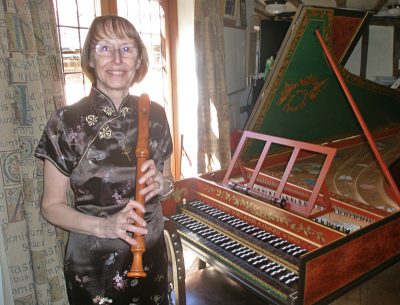 Marian Robertson Cert. Ed., B. Mus. (hons), L.T.C.L. (Music Ed) is an accomplished player of the recorders, piano and harpsichord and a passionate advocate for these instruments. She loves children and has taught many from complete beginners to a high standard, including her own children and grandchildren. Her daughter Elspeth Robertson (LINK) is an accomplished soloist and teacher herself.
Marian Robertson Cert. Ed., B. Mus. (hons), L.T.C.L. (Music Ed) is an accomplished player of the recorders, piano and harpsichord and a passionate advocate for these instruments. She loves children and has taught many from complete beginners to a high standard, including her own children and grandchildren. Her daughter Elspeth Robertson (LINK) is an accomplished soloist and teacher herself.
Biography
I trained as a class teacher and held a responsibility post for music throughout the school at Dulverton CP School, London SE9 from 1973-79. During this time I worked as a full time class teacher and also ran the school choir, recorder groups and guitar group. I played the piano for assembly and whole school singing and arranged many concerts, also taking part in music festivals with different schools.
During the next 20 years, whilst raising a large family, I became involved in many musical activities, part-time. These included play group (nursery) music, church choir/instrumental music and individual piano, recorder, flute, clarinet and oboe lessons.
A family connection with Dyslexia led to a Post-Graduate Diploma in Specific Learning Difficulties (dyslexia) in 1998. An intensive course, including child psychology, dyslexia assessment, structured and multi-sensory literacy lesson training and teaching practice. I ran my own Dyslexia Unit for several years thereafter. It is interesting how the skills learnt during this training are adaptable to my present Suzuki teaching.
Other interesting courses which have helped my teaching have been a Psychology of Music and Performance Anxiety course with Lucinda Macworth-Young, a composition and improvisation 3-day workshop and a week with the Kodaly Institute on an advanced singing course as part of my training for the LTCL (Music Ed.) diploma which I passed in 2000.
I spent 8 years studying part-time at Canterbury Christ Church and gained a B.Mus.(Hons) degree in recorder/harpsichord performance in 2006. I did start the M.Mus. degree but discovered the Suzuki Method of teaching and soon realised that this was the most important thing to me in my way forward as a teacher.
In 2008 I gained a Dip.ABRSM in recorder performance in order to further my performance skills.
During the last 4 years I have become a qualified Music Mind Games teacher at Level 2 and I use these music reading activitis in my present Suzuki teaching.
Teaching
From 1996 to date I have worked for Kent Music as an Ensemble Director, running adult/child recorder groups. During this time I also led theory classes, accompanied and led the Junior Choir, ran Grade 8 aural training classes and taught at Benenden Summer School.
Although no longer able to teach the ensembles at Kent Music (our Ashford centre was closed in 2010) I continue to run 2 adult ensembles from home (see Adult Ensemble page).
In 2009 I worked locally in a primary school teaching Yr. 4/5 pupils to play the recorder in large groups under the Wider Opportunities scheme and later taught an after school Key Stage 1 music group. Then I started my Suzuki training and started a small group with 4/5 yr olds, some of whom are still with me today. At the same time I had a 3 yr. contract with Kent Music to teach class recorders at 2 local CP schools. I decided to adapt the Suzuki Method for class teaching, and although it was not entirely possible to meet the full Suzuki criteria (see Suzuki page) it was successful and the children enjoyed and learnt much from the multi-sensory approach to music.
I now have my own private Suzuki Studio where I teach piano and recorder to children from 3 yrs. upwards.
A recent addition to my teaching is some lunchtime sessions at the local girls Grammar School teaching theory from Grades 1-5, some extra GCSE and also A-Level support.
Why Suzuki?
- because it is the most natural way in which to learn, as in the way a baby learns to speak its own native language. (See the Suzuki Method page)
- because I know, for me, it is the only way I want to teach children and wish that I had come across the method a long time ago!
- because any child can succeed – it is not dependent on what we call ‘ability’ (another story!) and because it is always successful if you take the trouble to do it properly.
